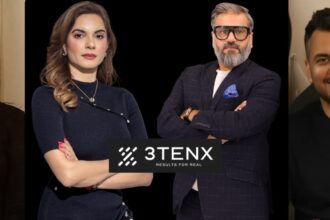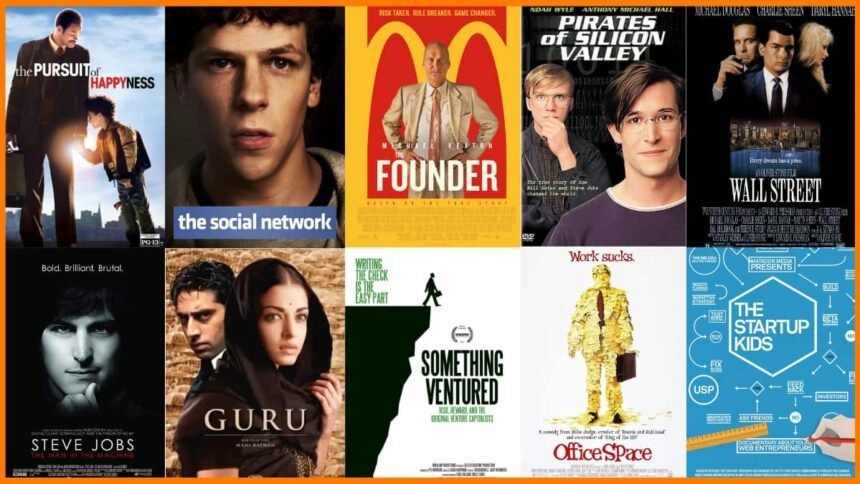Building a billion-dollar empire requires ambition, drive, and sometimes tough tactics. Movies like The Social Network and The Founder provide a glimpse into the lives of successful entrepreneurs, showing their triumphs and challenges. These films offer valuable lessons on vision, relationships, and ethical decisions.
Whether you’re seeking inspiration or cautionary tales, the top 25 startup movies in this list are packed with insights for young entrepreneurs looking to navigate their own business journey. Get ready for an eye-opening ride with these iconic stories.
The Social Network
Directed by David Fincher, The Social Network dramatizes the tumultuous early days of Facebook and its founder Mark Zuckerberg. Jesse Eisenberg delivers a standout performance as the ambitious yet socially awkward Zuckerberg, depicting his relentless drive to build a revolutionary company even as relationships suffer.
As an entrepreneur, I related to Zuckerberg’s restless innovation and hunger to make an impact by empowering people through technology. The film captures the thrilling ups and agonizing downs behind breakthrough ideas. We witness the exhilarating rush of Facebook expanding to new campuses as well as the anguish of lawsuits and betrayals threatening everything Zuckerberg built. He grapples with balancing friendships with business duties – a timeless startup struggle.
Ultimately The Social Network serves as a modern parable about the soul-searching behind “changing the world.” In pursuing his bold vision to connect billions, Zuckerberg loses himself – compromising ideals and people along the way. He gains global influence while becoming ever more isolated and empty inside.
The film inspires viewers to change culture while provoking hard questions. What is the line between creative inspiration versus theft? Do entrepreneurs owe loyalty to early believers in their mission or only the future they envision?
Fast-paced and insightful, The Social Network captures pivotal questions around ethics and identity in the digital age. It resonates widely today by revealing the complex people behind transformative innovations.
Tetris
The new biopic Tetris offers a fun, fast-paced take on the unbelievable journey of the iconic block-stacking game from behind the Iron Curtain to global sensation. Led by an infectious performance from Taron Egerton, the film blends real-life events with playful speculation in chronicling how Henk Rogers discovered Tetris at a 1988 computer show and became obsessed with bringing it to the masses.
We see Rogers leverage charm, tenacity and questionable legal maneuvers to secure the elusive rights from Tetris inventor Alexey Pajitnov (Nikita Efremov) and the Soviet government agency that claimed ownership. What emerges is a humorous fish-out-of-water tale pitting Rogers’ capitalist hustle against bureaucratic communist red tape.
Tetris has the breezy tone of a slick heist movie as Rogers races from Moscow to Tokyo to Silicon Valley, overcoming KGB agents, sinister businessmen and other unexpected obstacles in his quest. The film revels in the culture clash while humanizing the passion of both Rogers and Pajitnov behind making the game an international phenomenon.
While no doubt taking creative license, Tetris succeeds as a wildly entertaining underdog story celebrating innovation and the power of simple ideas to capture the imagination. For audiences and entrepreneurs alike, it serves as an unlikely reminder that world-changing success often stems from merely finding fun in stacking blocks.
The Founder
The Founder offers a compelling look at the ambition and innovation behind one of America’s most iconic brands. Michael Keaton delivers a standout performance as Ray Kroc, capturing his relentless drive as well as his ruthless tactics. For any young entrepreneur, it’s an engaging case study on seizing opportunities and the ethical dilemmas of hypergrowth.
What I found most valuable is the film’s exploration of partnerships going sour once stakes get high. The McDonald brothers resist expansion to protect quality but Kroc sees limitless potential to scale. Their fundamentally opposing mindsets breed resentment. It’s a common tension in startups needing both idealists and pragmatists. Maintaining alignment despite success is vital.
The Founder also shows how vital early funding and finance partners are for gaining leverage. Harry Sonneborn, played by B.J. Novak, recognizes real estate as McDonald’s path to riches. His outside-the-box thinking allows capitalization beyond food sales. Hence, bringing aboard business advisors who spot monetization options you miss can be game changing.
In my view, The Founder is a Shakespearean parable about the two-edged sword of entrepreneurial triumph. As Kroc transforms McDonald’s into a ubiquitous global chain, he loses himself in the process – compromising relationships and distorting the brothers’ original vision for quality food, speedy service and family-friendly values. It’s a sobering reminder that unbridled ambition can undermine the meaning behind one’s life work. For any founder, keeping perspective on your mission versus obsessing over metrics matters.
Lamborghini: The Man Behind the Legend
Lamborghini captures founder Ferruccio Lamborghini’s tireless pursuit of excellence in building legendary sports cars that redefined power and beauty on wheels. As an entrepreneur, I found inspiration in how Lamborghini leveraged his experience as a tractor manufacturer to shatter barriers in the elite auto industry.
The film also serves as a sobering profile of ambition turned toxic. Lamborghini’s obsessive perfectionism strains relationships and compromises values as he becomes isolated in his quest for icon status. The costs of his professional triumph undermine personal connections – he neglects his family, scorns loyal partners, and ultimately loses himself.
This reflects the difficult balancing act visionaries must master between rocketing to greatness commercially while remaining grounded in their principles and connections. Lamborghini’s ambition fuels breakthrough innovation but also breeds arrogance and skepticism of those committed to his original vision. His story provokes thought on ethical dilemmas founders face regarding loyalty versus progress as stakes intensify.
Ultimately for entrepreneurs, Lamborghini embodies the soaring spirit required to imagine game-changing ideas tempered by cautionary lessons on the perils of prioritizing metrics over meaning. Much like The Founder and other parables, the film captures how the iconoclastic thinking driving disruption can either liberate you or isolate you. Maintaining alignment, perspective and connection on the journey matters as much as the destination.
The Wolf of Wall Street
The Wolf of Wall Street, directed by Martin Scorsese, offers a provocative if controversial look at the true story of Jordan Belfort (Leonardo DiCaprio), a stockbroker who builds a fraudulent empire in the 1990s based on pumping and dumping penny stocks, only to lose everything once the FBI catches on.
I found sobering lessons in how Belfort’s unethical business practices and hedonistic lifestyle ultimately proved his downfall. The film highlights the seductive allure of money, drugs and sex in distorting one’s ethical compass. Surrounded by shady mentors and yes-men, Belfort rationalizes increasingly riskier criminal behavior as he pursues profits and pleasure without restraint.
Possibly, The Wolf of Wall Street seems to glorify the very excess it condemns. I found that at times the movie seemed to be reveling in the debauched antics it depicted. Yet the dizzying highs of Belfort’s fraud-fueled success make his eventual downfall only more dramatic. In the end, the movie serves as a morality tale exposing the dark side of ambition left unchecked.
While controversial, The Wolf of Wall Street succeeds as a cautionary study of ambition turned toxic. Personally, it’s one of my favorite sales movies of all times. It provokes thoughtful debate around issues like greed versus ethics and the fine line between hustling and corruption. The questions it raises confront all entrepreneurs seeking to build businesses today. Its messages about how easy it is to rationalize unethical behavior ring disturbingly true.
Joy
Joy, directed by David O. Russell, tells the fictionalized story of Joy Mangano (played by Jennifer Lawrence), a struggling Long Island single mom who builds a business dynasty by inventing the Miracle Mop. While taking creative liberties, the film captures Joy’s journey from modest beginnings to becoming the matriarch of a powerful family enterprise.
I found Joy to be an inspirational portrait of entrepreneurial perseverance against all odds. What comes across is Joy’s relentless drive and vision even as she faces skepticism from industry gatekeepers, betrayal from business partners, and resistance from her chaotic family. Her passion for innovation and creative problem-solving in the face of many obstacles resonated strongly.
Through the outstanding acting, Jennifer Lawrence has done an amazing job highlighting the challenges that female entrepreneurs contend with regarding credibility and securing financing. Joy has her miracle mop invention dismissed as a “cute little housewife project” initially by the male-dominated world of manufacturing and retail. Overcoming gender bias and patronization to sell male executives on the potential of her product makes Joy’s success all the more satisfying.
While dramatized, Joy succeeds as an uplifting underdog story that young founders can find motivation in. The film brings to life the real tensions of balancing business growth versus personal relationships through Joy’s frayed family ties. Overall, Joy delivers an accessible portrait of the vision, sacrifice and sheer determination behind one woman’s entrepreneurial triumph against the odds.
The Big Short
The Big Short, directed by Adam McKay, offers a scathing yet entertaining look inside the buildup and aftermath of the 2008 financial crisis. Adapted from Michael Lewis’ non-fiction book, it follows several Wall Street outsiders who spot the massive housing bubble well before it bursts, then bet against the market to profit from its collapse.
For any young entrepreneur, The Big Short provides sobering lessons on unchecked greed and the critical need for accountability. We see bankers packaging high-risk subprime mortgages while credit agencies give them fraudulent AAA ratings. The characters realize the entire system is built on myths – yet regulators turn a blind eye.
Ultimately the housing market implodes just as our protagonists predict. But The Big Short refuses to celebrate them as heroes – rather, it exposes how even those making money off the crisis failed to raise the alarm. The film criticizes Wall Street corruption while also suggesting that those who were indifferent to the suffering it caused share some responsibility.
There are no easy answers offered, only hard truths. The Big Short calls viewers not just to point fingers but to search their own souls. How do we address root problems versus symptoms? What does ethical leadership look like? How can we create cultures of conscience rather than complicity? These questions confront entrepreneurs building companies today.
While fast-paced and entertaining, The Big Short raises thought-provoking issues about financial ethics and accountability worth wrestling with. Its messages around greed’s slippery slope resonate far beyond Wall Street.
Ford v Ferrari
Ford v Ferrari dramatizes the against-all-odds true story of automotive visionary Carroll Shelby and racecar driver Ken Miles, who team up to build a revolutionary Ford racecar to challenge Ferrari’s dominance on the track. As an entrepreneur, I found the film deeply resonant in capturing the relentless perseverance required to disrupt Goliaths in any industry.
We witness Maverick Miles and car designer Shelby boldly convince Ford to take on the presumed impervious Ferrari at Le Mans. Through setbacks and corporate resistance, they leverage their scrappiness and passion for innovation to push boundaries others view as impossible. Miles’ racing instincts blended with Shelby’s automotive creativity ultimately craft a machine primed to shock the racing establishment.
Beyond the pulse-pounding racing scenes lies larger themes of visionary non-conformists challenging outdated assumptions to find fresh perspectives. Ford v Ferrari captures how underfunded upstarts can use technology, partnership and sheer will to rewrite stale industry standards. Yet innovation requires convincing disbelievers wedded to the status quo to recognize the possible.
I found Ford v Ferrari a rousing profile of the resilience required to overcome skepticism from corporate gatekeepers and convention-minded consumers. It will inspire any successful entrepreneur aiming to defeat seemingly invincible competitors through the power of conviction. In the end, giants fall hardest to agile outfits leveraging hunger, heart and imagination. The film proves visionary racers can still beat behemoths.
BlackBerry
BlackBerry dramatizes the exhilarating yet sobering journey of a tech pioneer derailed by shifting tides. We witness the spark of genius as childhood friends Mike Lazaridis (Jay Baruchel) and Doug Fregin (successful film director Matt Johnson) leverage innovation to disrupt the mobile phone market. Yet their meteoric rise gives way to catastrophic demise with the iPhone’s arrival.
As an entrepreneur, I discovered poignant lessons in BlackBerry’s portrait of visionaries upending conventions through sheer conviction and grit, and the importance of finding the right co-founder. Lazaridis and Fregin embody the hustling, scrappy ethos required to turn game-changing ideas into reality. We see them bootstrap a breakthrough device despite skepticism, then leverage bold thinking to meet soaring demand. They harness technology to empower people to communicate and access information anytime, anywhere.
Yet the film also serves as a sobering corporate cautionary tale. In aggressively pursuing exponential growth, BlackBerry loses sight of its core values. Its culture curdles from mission-driven camaraderie into cutthroat corporate world. Relationships fracture. Short-term profits replace passion as the priority.
This true story offers inspiration tempered by warning. Its founders’ infectious optimism fuels innovation but blinds them to shifting market winds. For entrepreneurs, the film provides essential lessons on balancing conviction with adaptability, and people with profixts. It captures how losing alignment with one’s north star, values and team can undermine the most promising ventures when storms hit.
Wall Street
Oliver Stone’s classic 1987 drama Wall Street remains startlingly relevant today in its dissection of unchecked greed. The film chronicles ambitious young stockbroker Bud Fox (Charlie Sheen), who becomes enamored with ruthless corporate raider Gordon Gekko (Michael Douglas). Eager to get ahead, Bud begins trading on insider information – rationalizing unethical behavior as a cost of success.
For entrepreneurs, the film resonates as a morality tale on ambition’s slippery slope. We witness Bud compromise his values inch-by-inch to ascend the corporate ladder – shades of ethical corner cutting many founders may relate to. The movie highlights how money and power can become distorted ends rather than means toward innovation.
Ultimately, Bud must wrestle with the soullessness underlying Gekko’s “Greed is good” credo when his mentor targets his father’s airline company. This prompts sobering self-reflection on what Bud sacrificed in his single-minded pursuit of status.
While fast-paced, Wall Street succeeds more as cultural critique than drama – its messages around unchecked ambition and insatiable materialism still ring disturbingly true. Gekko represents an extreme yet compelling personification of ruthless capitalism left unbridled. For entrepreneurs, that serves as both alluring wish fulfillment and cautionary tale.
30 years later, Wall Street remains essential viewing for founders in examining their own motives and relationship to money and power. Its lessons prompt the questions: What are you willing to compromise and why? At what cost comes your success, and will it satisfy?
Boiler Room
Boiler Room offers a compelling look at the high stakes business world of shady stock brokerages. The 2000 crime drama, written and directed by Ben Younger, follows college dropout Seth Davis (Giovanni Ribisi) as he gets caught up in the fraudulent practices of a Long Island “boiler room” firm peddling worthless stocks.
What I found valuable as an entrepreneur was how Boiler Room explores ambition turned toxic once ethics become compromised. At first, Seth revels in the adrenaline-fueled pressures of cold-calling clients and closing deals. “It’s not about the money, it’s bigger than that,” proclaims boss Jim Young (Ben Affleck). Yet the firm’s get-rich mantras seduce Seth across ethical lines.
The movie highlights the slippery slopes of greed eroding conscience over time. Younger doesn’t demonize the brokers, instead humanizing how ostensibly “good” people rationalize increasingly shady behavior once immersed in certain cultures. As with Wall Street and Glengarry Glen Ross, we see salesmen resorting to unethical tactics once desperation sets in to meet steep quotas.
While fast-paced, Boiler Room serves as a morality tale about the dangers of unchecked ambition and greed. Its messages around ethical compromises made in the name of success ring disturbingly true in business today. The film inspires thoughtful debate on the values underlying high pressure sales cultures and the potential predatory nature of them.
Glengarry Glen Ross
Adapted from David Mamet’s acclaimed play, Glengarry Glen Ross offers a riveting fly-on-the-wall look at the cutthroat world of real estate sales. We follow four desperate agents contending with ruthless quotas, willing to employ dubious tactics to land promising leads.
From my experience talking with sales reps, I found great value in how the film spotlights the immense pressures commissions-based roles exert. When the characters’ livelihoods grow threatened by rigid expectations, ethical lines erode as survival instincts kick in. What lengths seem justified when failure means not providing for one’s family? Glengarry provokes thoughtful debate around ambition’s slippery slope and integrity’s true cost.
While the film evokes sympathy for the salesmen’s difficult situation, Glengarry Glen Ross avoids making simplistic judgments. Mamet shrewdly incorporates multiple perspectives – including those just trying to do their jobs amidst the chaos. When deception occurs, there are no simple villains or heroes. Instead there are only complex people losing their way when systems fail them.
Fast-paced and packed with virtuoso performances, Glengarry Glen Ross succeeds as both riveting drama and deeper commentary. It compels viewers to examine our own motives and integrity when under pressure. When faced with unreasonable demands, how do we respond – with empathy or accusation? The film suggests that success depends on the cultures we create and incentives we put in place. Its messages around greed’s slippery slope ring disturbingly true still today.
Startup.com
Startup.com offers a raw, behind-the-scenes look at the exhilarating rise and fall of govWorks – an ambitious 1990s dotcom startup aiming to revolutionize government services. Through cinéma vérité footage, we witness founders Tom Herman and Kaleil Tuzman navigate the mounting pressures of hypergrowth, interpersonal conflicts and technical woes that ultimately undo their promising venture.
I found the film valuable in humanizing the emotional journey behind the stereotypical dotcom bubble story. We see the infectious optimism giving way to despair, camaraderie spiraling into resentment, grand vision distorted by day-to-day chaos. Much like a Shakespearean tragedy, an initial heroic quest for meaning becomes undone by the protagonists’ own flaws and imperfections.
Yet Startup.com resists easy morality tales. The filmmakers refuse to demonize the ambitious, driven dotcom generation who often sincerely wanted to change the world. Instead we’re left pondering timeless questions about friendship, values and our inability to control forces greater than ourselves.
In the end, Startup.com succeeds in capturing a specific moment in Internet history – but its messages around relationships fraying amidst pressure, mistrust breeding paranoia, and the difficulty of maintaining perspective resonate universally. Any young entrepreneur today would be wise to heed its lessons.






